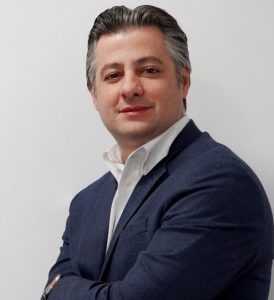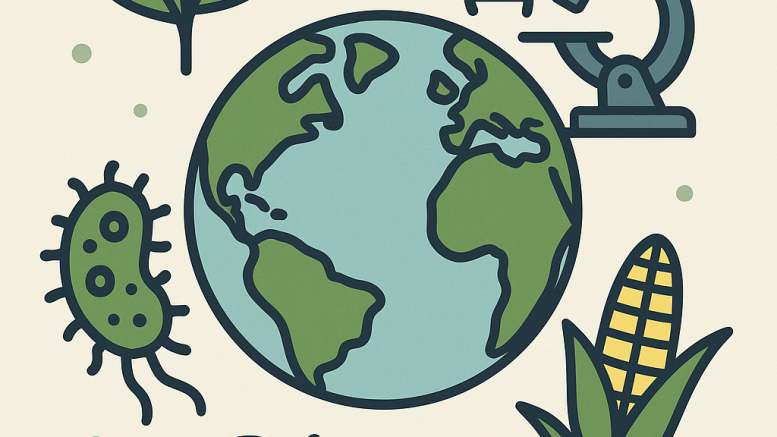“Biological products have become one of the most significant bets of modern agriculture…”
Raphael Godinho is the global marketing director at Corteva Biologicals, holds a degree in agronomy from the federal University of Lavras and a master’s in marketing from ESPM. He is currently based in the USA.
Gustavo Mamao is the head of international business development at IdeeLab, holds an MBA from the MIT Sloan School of Management and a degree in business administration from Federal University of Minas Gerais. He is currently based in the USA.

Gustavo Mamao, head of international business development at IdeeLab
AgriBrasilis – Has your international experience changed your perception about bioinputs?
Raphael Godinho – Certainly. I’ve devoted almost half of my career to the Brazilian crop protection market and the other half to global markets across all regions. Over the past five years, my focus has been fully directed toward building Corteva’s Biologicals Platform. This experience has given me a broad perspective. The biologicals market is ready for continuous growth and evolution to meet farmers’ needs, regardless of region, crop, or market.
Of course, this progress must account for regulatory specificities and how these solutions can integrate with existing agronomic practices. Globally, it’s clear that biologicals are not a “silver bullet.” Success depends on being close to farmers and ensuring that the right agronomic knowledge is in place—not just expertise about the product itself, but a holistic understanding of fertility, plant physiology and soil health.

Raphael Godinho, global marketing director at Corteva Biologicals
Gustavo Mamao – Now living in the Boston area, my international experience has shown me the need to build bridges with leading knowledge and technology hubs in sectors such as human health so that Brazil can maintain its leadership in the new generations of bioinputs. On the other hand, with Brazil’s market experience in biological inputs, home to the highest adoption rates among farmers, and with a uniquely Brazilian way of driving innovation that is more agile and practical, we can teach the world the very elements that have made Brazil the global leader in this market.
AgriBrasilis – What is Brazil’s role in the bioinputs market?
Raphael Godinho – Brazil represents the market with the greatest growth potential for biological products worldwide. Bioinputs have become one of the most significant bets in modern agriculture and are rapidly expanding in the country, reaching US$ 3.5 billion in sales during the 2024/25 season and recording an annual growth rate of approximately 15% over the past five years. For the domestic market, Blink projects that annual growth will remain between 8% and 9% in the coming years, surpassing US$ 7.4 billion by 2032.
Gustavo Mamao – Twenty years ago, when I first had contact and experience with a biological control company, I could not have imagined the strength Brazil would achieve in this sector. We were taught to think that everything coming from outside Brazil is better, and in recent months, working as head of international business development at IdeeLab, I have been impressed by how respected Brazil is in this field. Recently, I was in California at one of the most influential biologicals events, and everyone spoke of Brazil as the benchmark, as the example to follow.
We need to take advantage of this highly positive perception, and as a sector, we need to think more strategically and work better on internationalization opportunities. As I say for people at IdeeLab, it’s not enough to simply translate what we do into English; we need to adjust our mindset to think like those in other markets.
AgriBrasilis – What are the differences between Brazil and the other major markets?
Raphael Godinho – Globally, around 35% of farmers use biological products in their operations. Overall, the global market for biological products is expected to reach approximately US$ 26 billion by 2035, as adoption rates continue to grow in the coming years.
Brazil stands out in this global scenario due to its farmers openness to adopting innovative solutions that enhance agricultural production. Brazilian farmers are recognized for integrating new technologies into their management practices, including biologicals, to improve sustainability, productivity and resilience in the field. This progressive mindset positions Brazil as one of the most dynamic and promising markets.
Gustavo Mamao – Everyone evaluates opportunities in each market taking into account that country’s regulatory framework, which has a major influence on the biologicals sector. In recent years, Brazil has made significant progress in this area, which has become a positive factor. Another difference is how each region considers its local production strengths. For example, Brazil is the world’s largest coffee producer, while California is the world’s largest almond producer. But sometimes this also creates a very narrow perspective. Could U.S. almond growers learn biologicals management practices from Brazilian coffee farmers?
In the case of some more subtle differences, the way business is conducted also varies. A U.S. company is very rational when making decisions to test or develop a new product, with a mindset focused on “what could go wrong.” A Brazilian company, on the other hand, is more driven by emotion, working with a vision of “what could succeed.” In the end, combining these styles can be a great formula for success.
AgriBrasilis – What makes a project or product successful inside the farms?
Raphael Godinho – For a biological product to be successful in the field, it is essential to follow the usage recommendations indicated on the label and the guidance of the responsible agronomist. Success depends on the interaction of several positive factors, from the intrinsic quality of the product to environmental conditions and crop management. The viability of the microorganisms and their effective performance in the crop and the environment are fundamental.
Corteva Agriscience is an agricultural technology company focused on innovation. It invests approximately US$ 4 million per day globally in research and development (R&D) across all its business areas, including crop protection and seeds. In addition, it conducts extensive research and testing with all products launched to the market, as well as with the biological technology companies with which it partners. We also work with scientists and farmers worldwide to test these products, ensure their efficacy and identify how farmers can use them to achieve the best results.
Gustavo Mamao – IdeeLab follows a highly systematic approach with strict quality control throughout the entire process. We work with an innovation process based on TRLs (Technology Readiness Levels). This process takes into account the effect of the biological input at its various stages of development, from the laboratory to the field and also strongly considers the economic feasibility of the production process. A biological product with a long and complex production process may prove unviable.
Going through this process, our clients, who are companies in the biologicals sector, carry out the “go-to-market” work, which must be centered on the farmer’s needs. For example, the product must be effective and easy to produce, but it also needs to consider convenience and the maintenance of its characteristics at the time of application.
AgriBrasilis – What does the market still not understand about biologicals?
Raphael Godinho – Although the adoption of biologicals is steadily advancing worldwide, there are still several challenges that need to be overcome to accelerate global adoption. For example, farmer awareness and training remain critical, as the effective use of biological products often requires a shift in mindset and practices. In this context, robust, transparent and scientifically based data are essential to demonstrate efficacy, ensure regulatory compliance and strengthen trust among stakeholders. Coordinated efforts in public policy, education, innovation and investment are important to fully unlock the benefits of biologicals.
The biological products market offers great opportunities, and today we are only seeing the tip of the iceberg of innovations that can help farmers in integrated crop management. These products pave an entirely new path for developing solutions that complement traditional chemical technologies, enabling significant technological advances that were not possible before. At Corteva, we view biologicals as a growing market with immense potential for more sustainable agriculture.
Gustavo Mamao – The market has already advanced a lot. The expectation for biological products used to be that they would behave like chemical products. I once heard a farmer complain about a biological product I was working with because it didn’t kill the ants in the soil.
We are in a different phase now. There is much greater awareness that this is a product with a distinct nature. Even so, there is still plenty of room for educating farmers, especially about the long-term effects of the product.
Brazilian farmers are also teaching the world that biological-based management is possible. A farmer from California who visited us a few months ago, part of a delegation learning more about biological inputs in Brazil, returned impressed with what he saw: conventional Brazilian farmers using biologicals for one-third of their management inputs.
AgriBrasilis – What decision shaped your career and why?
Raphael Godinho – A turning point in my career occurred 5 years ago, when I decided to make a transition after more than 15 years in crop protection to embrace a new opportunity at Corteva: helping to build the global biologicals business from the ground up. This change opened the doors to a wide range of experiences: learning, contributing, listening and leading, while staying close to both the needs of farmers and society’s broader call for more sustainable agricultural solutions.
This journey has also allowed me to collaborate and learn from experienced experts in the biologicals field, including those who joined Corteva at the beginning of this journey and others who came through more recent acquisitions.
Gustavo Mamao – I have been an entrepreneur in this sector for literally two decades. Last year, when I met Ronaldo Dalio, founder and CEO of IdeeLab, and he told me what was happening in the sector from an innovation perspective, I was very impressed. It was as if I had participated in the market when everyone still had that Motorola on their belt, and I woke up to find that everyone was switching to the iPhone.
Changes in agriculture do not happen overnight; they are slower, as they need to respect the cycles of nature. But I believe that when we get there in 10 or 20 years, we will indeed see real leaps driven by the use of biological inputs, and I want to witness this transformation happen.
READ MORE:
COP30 is an Opportunity for Brazilian Agriculture to Be “Part of the Solution”

